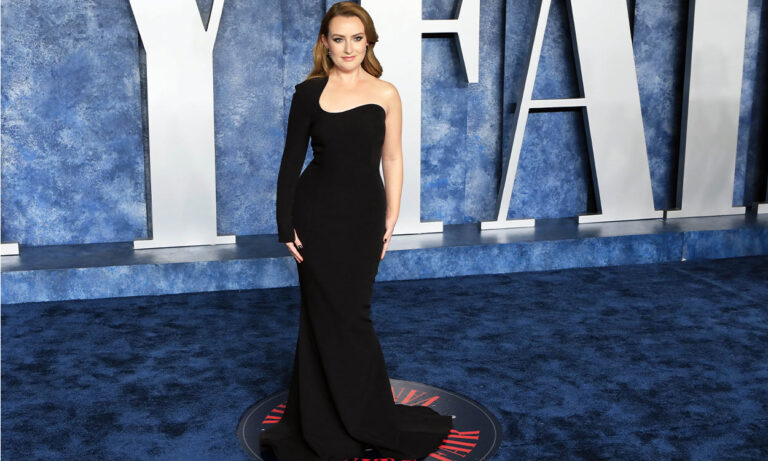First we fell in love with Amelia Dimoldenberg. Now we want her to fall in love with Andrew Garfield

Once considered a pretty obscure and niche show, Chicken Shop Date (aka, the internet’s equivalent to celebrity speed dating) has catapulted journalist and host Amelia Dimoldenberg to astronomical heights. From Morley’s in Brixton to the BRIT Awards, the 29-year-old has built herself an impressive media empire, with over 1.8 million subscribers on her YouTube channel, and an interviewee portfolio that includes the likes of Shania Twain, Burna Boy, and Keke Palmer.
And now, as this year’s awards season slowly comes to a close, Dimoldenberg has managed to officially solidify herself as the red carpet’s most eligible bachelorette. And, while the content creator may have cosied up with almost all of Hollywood, netizens everywhere internally cried when they realised that one special someone was missing.
Though it certainly isn’t the case, it often feels as though Dimoldenberg’s shimmy up the social ladder happened practically overnight. A few years ago, she was still interviewing predominantly British-based rappers and grime artists while munching on chicken nuggets. Fast forward to a mere two days ago and Dimoldenberg was the go-to interviewer at the highly coveted 2023 Vanity Fair Oscar party—an event so choc-a-bloc with A-listers that it makes Coachella look like a low-key summer barbeque.
Mingling with the likes of The Last of Us zaddy Pedro Pascal, Sabrina Carpenter, and newly single Irish actor Paul Mescal, Dimoldenberg—who at this point has perfected her awkward-deadpan flirtation skills—charmed the copious guests and once again proved that her online personna is not only transferable from social media to real life, but that her uncomfortable yet sweet demeanour actually disarms a number of Hollywood’s steeliest celebs.
However, I (along with the rest of the internet) was saddened, nay, dismayed, to see absolutely zero interaction between the YouTube sensation and the one prospective partner she just can’t seem to snatch for a proper date: actor and international heartthrob Andrew Garfield.
Having first stolen our hearts during their interaction at the BRIT Awards in 2022, wherein Dimoldenberg stated she’d been trying to nab a date with the The Amazing Spider-Man star for some time, fans immediately sensed a level of chemistry between the two.
Naturally, this online frenzy increased when the two reunited at the 2023 Golden Globes—an event where Dimoldenberg was also taking lead-point and therefore thrust further into the mainstream. The pair chatted away, the content creator cheekily noting “we must stop meeting like this,” while Garfield commented on how they had a lot of astrological compatibility. I mean, does it get more romantic than that?
Truth be told, the duo had genuine chemistry, most likely due to a potential off-screen friendship, or simply because they naturally vibed with one another. Nevertheless, whatever the behind-the-scenes gossip may be, we enjoyed every second of it. Fingers crossed it won’t be the last of their in-public interactions.
What are people’s thoughts on Amelia Dimoldenberg and her career?
Some journalists within the industry take umbrage with the fact that online stars such as Dimoldenberg and prominent TikTokers are being favoured for these kinds of opportunities, over more established media insiders.
It’s become a common mindset among older millennials and boomers to patronise and thereby look down on the sheer influence (and talent) of internet personalities. As with any industry, there are some individuals who are given enormous opportunities despite having little to no abilities, but I’d argue that this isn’t the case here.
Short-clips from award interviews are nowadays built for soundbites rather than deep insight, and who better to grab a soundbite than someone who specialises in viral internet content?
It should also be noted that, while still highly accomplished, Dimoldenberg doesn’t really fit the ‘rags to riches’ archetype. For one, she grew up in a highly affluent area of London and received an excellent standard education. Moreover, her father is British politician Paul Dimoldenberg. While this doesn’t erase the work she put in during the nine years she spent cultivating the Chicken Shop Date format and finding artists to interview, it’s a massive factor to consider when we look at her trajectory into the mainstream media.
Dimoldenberg has also been a highly divisive character for some. In August 2022, Refinery29 stated: “[She] cleverly uses the juxtaposition of an awkward white girl in a chicken shop as her whole gimmick, drawing in viewers because it’s something they haven’t seen before. However, this has led some to question her involvement in UK Black British spaces.”
Expanding, the publication noted how Dimoldenberg’s success is inherently symptomatic of white privilege. Questions over whether her show is problematic or not are raised when considering how, as a white woman, she is able to step into these predominantly working-class and black spaces, and end up with significant financial and commercial gain.
The creator has addressed these issues, stating in an interview with Complex: “I think it’s important to talk about these things. I feel a lot of responsibility to make sure what I’m doing is authentic and respectful. I’m also aware, part of the reason people like watching my videos is because they play off the humour that naturally occurs when two different cultures collide.”
Dimoldenberg continued: “I take my job in the scene that I’m working in very seriously. As I’ve said before, I’m very aware of my privileged position as a white woman, however, I hope I’m using it to fully support UK artists.”
Will Amelia Dimoldenberg be at the 2023 Met Gala?
So, the last question is: Will Dimoldenberg’s success among the upper-echelon of Hollywood continue, and will it expand over into the most coveted fashion event of the year? The likes of internet stars Lisa Koshy and Emma Chamberlain have acted as official interviewers on the carpet before, who’s to say Dimoldenberg won’t be next?





